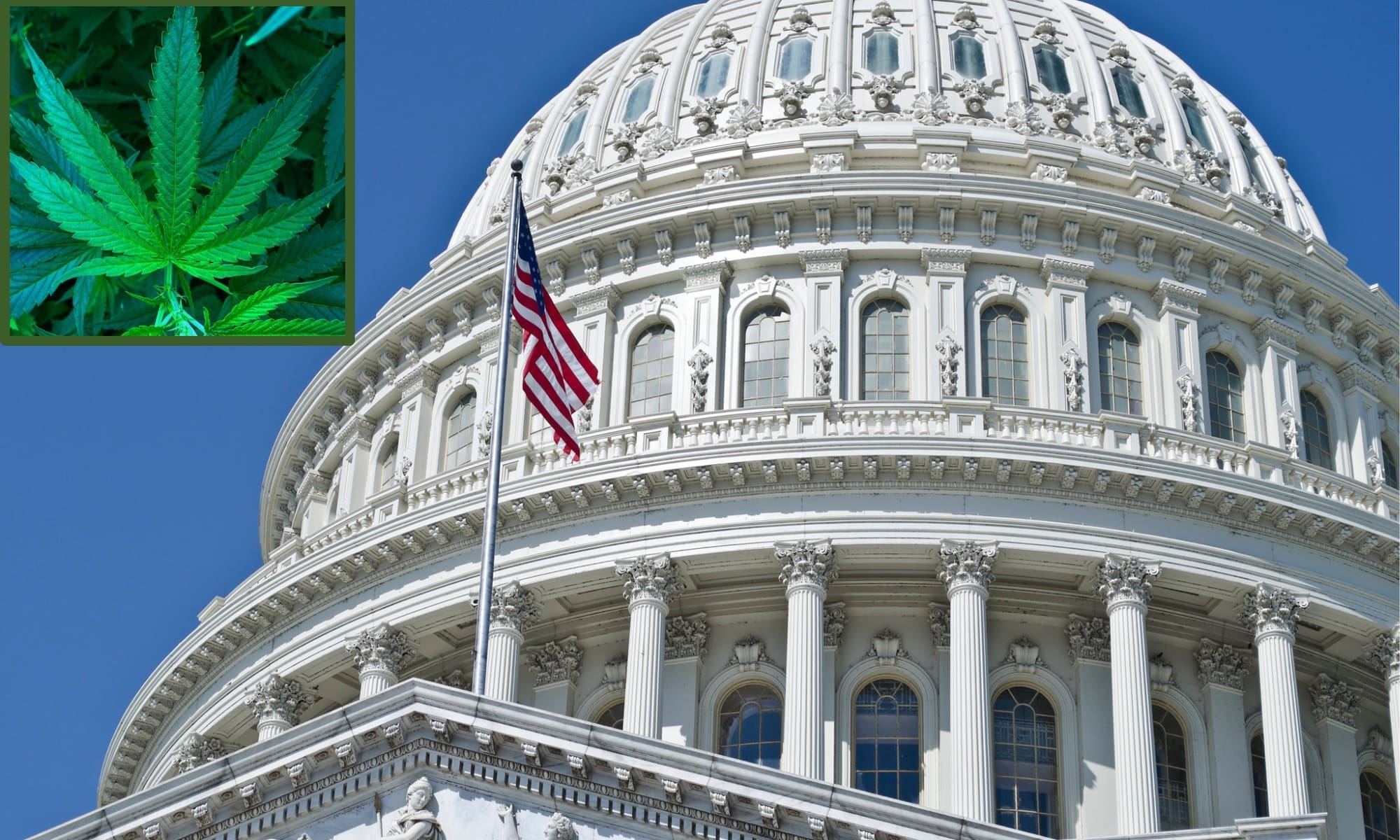Politics
Congressional Committee Discusses Challenges Marijuana Businesses Face In Economic Recovery From COVID

A congressional committee held a hearing on Thursday to address the unique financial challenges that small and minority-owned businesses face as the economy recovers from the COVID pandemic—with a particular focus on how those struggles have played out in the marijuana industry under federal prohibition.
The House Financial Services Subcommittee on Consumer Protection and Financial Institutions, chaired by Rep. Ed Perlmutter (D-CO), heard testimony from the Minority Cannabis Business Association (MCBA) on the economic barriers federal policy has created within the burgeoning market.
“States and territories continued to legalize medical and adult-use cannabis—Mississippi just passed legislation establishing a medical cannabis program this month,” Perlmutter said in his opening remarks. “Yet we will not have even resolved the conflict between federal and state banking laws.”
“Not only must these businesses contend with the ongoing pandemic and other economic uncertainties without being eligible for any federal [Small Business Administration] aid, but they must do so while being shut out of the banking system,” he said. “A public safety threat is forcing this industry to do business in all cash [and] is turning into a public safety nightmare.”
A potential solution to at least some of these challenges could be passage of Perlmutter’s own bill, the Secure and Fair Enforcement (SAFE) Banking Act, which would protect financial institutions that work with state-legal cannabis businesses. That piece of legislation recently cleared the House for a sixth time, but it’s continued to face resistance in the Senate under both Democratic and GOP control.
Senate leadership has argued that comprehensive legalization must be enacted first, though Majority Leader Chuck Schumer (D-NY) has signaled that he’d be open to advancing SAFE Banking if certain amendments were made. It’s possible the discussion at the hearing could help to inform those changes.
Watch the House Financial Services Subcommittee hearing in the video below:
Perlmutter began his questioning by addressing MCBA Executive Director Amber Littlejohn. He asked her to describe how the industry’s lack of access to traditional lines of credit and investment opportunities has contributed to small cannabis businesses “being pushed into predatory loans and business arrangements.”
“With federal law limiting access to traditional funding, many cannabis businesses are initially funded through friends and family and personal wealth—and, given the wealth disparities, especially among those most impacted by cannabis prohibition and the war on drugs, this is not an option,” Littlejohn said. “Large operators have no issue accessing capital.”
Rep. Ayanna Pressley (D-MA) also addressed the issue at the hearing, noting that the industry’s specific exclusion from federal relief during the COVID pandemic “added insult to injury” for small and minority-owned businesses.
“Ensuring black and brown folks can start and sustain cannabis businesses is a matter of economic and racial justice,” the congresswoman said. “There are many attempts to keep those that were disproportionately locked up because of this failed war on drugs, to keep them locked out from this multibillion dollar industry,” the congresswoman said. “This need has become even more evident when compounded by the disparate impact COVID has had on communities of color and minority-owned businesses.”
Pressley asked Littlejohn how the pandemic has “exacerbated current racial inequities within the cannabis industry” and why it’s important to be “intentional in ensuring that minority- and women-owned cannabis businesses are not left behind in our recovery efforts.”
Littlejohn said that “many people agree that ensuring that the people who’ve been most harmed by cannabis prohibition are participating is an important part of legalization—but the way the state laws are created right now, they are dealing with almost insurmountable barriers to entry and the challenge of competing when markets are captured by a handful of individuals.”
“It is really a dire situation, and if we don’t get the resources now, many minority businesses are just not going to make it to legalization,” she said. “They won’t make it to the end of the year. And, as I mentioned earlier, there are some, unfortunately, that will not make it to the end of this week.”
The congresswoman added that she supports legislative efforts to fix these and other financial issues within the marijuana sector by passing legislation like Perlmutter’s SAFE Banking Act. But she stressed that “we also need comprehensive and systemic reforms to ensure that our communities are not left behind,” citing the Marijuana Opportunity, Reinvestment and Expungement (MORE) Act as an example.
House Agriculture Committee Chairman David Scott (D-GA) also expressed interest in the cannabis issue at the hearing, saying that hemp has “become our fastest growing product” in the U.S., and he’s interested in exploring ways to ensure that the industry is legitimized while keeping bad actors out. He invited Littlejohn to reach out to his office as lawmakers begin working on the 2023 Farm Bill.
“I want to be certain that we can help our farmers,” the congressman said, adding that she has “a wealth of valuable information that will be very helpful to our farmers who are engaged in this and our agriculture industry”
With respect to SAFE Banking, Perlmutter has said that he’s amenable to building upon his bill to satisfy the Senate–but he also cautioned that making the measure too broad could compromise the bipartisan support it has enjoyed in the House. He also said recently that he’s “confident” that the Senate will finally take his bill up—something he’s committed to accomplishing before his retirement at the session’s end.
“Small businesses in the cannabis industry also face additional challenges when seeking credit or other financial services,” a committee memo on the hearing says. “For example, people of color operating in the cannabis industry must overcome barriers like trying to break into an industry that lacks diversity, especially among larger cannabis companies.”
“Additionally, most cannabis businesses are also unbanked or underbanked because most financial institutions are unwilling to open even basic bank accounts for cannabis businesses due to cannabis being federally illegal,” it continues. “This forces cannabis business owners to operate their state-regulated businesses primarily using cash, which has increasingly made them targets for burglaries, robberies, and other crimes.”
The SAFE Banking Act “would provide a safe harbor for financial institutions that choose to serve state-legal cannabis businesses and would require a GAO study and annual regulator reports to Congress to monitor that there is equal access to credit and to reduce barriers to marketplace entry for minority-owned and women-owned cannabis-related businesses,” the memo says.
—
Marijuana Moment is already tracking more than 1,000 cannabis, psychedelics and drug policy bills in state legislatures and Congress this year. Patreon supporters pledging at least $25/month get access to our interactive maps, charts and hearing calendar so they don’t miss any developments.
![]()
Learn more about our marijuana bill tracker and become a supporter on Patreon to get access.
—
Littlejohn, who was one of five witnesses to testify before the panel, said in her written testimony submitted ahead of the hearing that the industry has witnessed a “common tale of small businesses struggling to enter and sustain themselves because of extraordinary barriers to entry and limited access to capital.”
“We see a common cycle of minority entrepreneurs seeking to shake the economic consequences of systemic inequities, only to suffer at the hands predatory investors and partners who seek to profit from injustice,” she said.
Littlejohn listed four primary challenges that small marijuana businesses face under the current federal policy and economic climate.
“First, the COVID-19 pandemic and resulting economic uncertainty have been particularly difficult for small businesses, but especially for minority-owned and operated cannabis businesses, because minority-owned and operated cannabis businesses were shut out from the federal government’s pandemic relief programs,” she said.
Also, federal prohibition has resulted in a lack of access to capital for small and minority-owned marijuana businesses, and that’s translated into low representation of communities most impacted by criminalization within legal marijuana markets.
“In competitive markets, the pre-application and application costs for small cannabis businesses commonly exceed millions of dollars, especially in states that require hopeful licensees to secure a ‘green zone’ premise or show proof of capital in order to apply,” she said. “Obtaining adequate capital is quite difficult and often forces entrepreneurs to accept exploitive contracts from private investors.”
Additionally, Littlejohn addressed state-level policy attempts to promote minority participation in the legal market. She said while that may be the design of equity programs, they are largely “failing to adequately support small and minority-owned cannabis businesses.”
She also said that “small and minority-owned cannabis businesses cannot access the traditional financial services they need to survive, let alone thrive.”
“Until small and minority-owned and operated cannabis businesses can access financial services on a fair, competitive basis, they will continue to be left behind as other sectors of our economy recover. Thus, they will continue to fall behind much larger competitors who do not face these challenges to a similar extent,” the MCBA testimony says.
Littlejohn concluded the written testimony by calling for congressional reform, which should include passage of the SAFE Banking Act this session.
She also said the protections included in the marijuana banking bill could also be helpfully extended to non-bank community development financial institutions (CDFIs) and minority depository institutions (MDIs) under the Federal Deposit Insurance Corporation (FDIC).
“Supporting small minority cannabis businesses is not just moral imperative, it makes good economic sense. Despite their struggles, cannabis social equity businesses contribute $1.2 in social good for every $1 invested into social equity programs,” Littlejohn said.
“If we believe the cannabis industry should have a place for small businesses, especially those who bore the brunt of enforcement while building the culture, the market, and the political force behind an industry from which others profit, we have to help minority cannabis businesses now,” she said.
Meanwhile, some Republicans are scratching their heads about how Democrats have so far failed to pass the modest banking reform with majorities in both chambers and control of the White House, too. For example, Rep. Rand Paul (R-KY) criticized his Democratic colleagues over the issue in December.
In the interim, federal financial regulator Rodney Hood—a board member and former chairman of the federal National Credit Union Administration (NCUA)—recently said that marijuana legalization is not a question of “if” but “when,” and he’s again offering advice on how to navigate the federal-state conflict that has left many banks reluctant to work with cannabis businesses.
Hawaii Senate Committee Approves Bill To Legalize Marijuana For Senior Citizens 65 And Older
Image element courtesy of Tim Evanson.
















